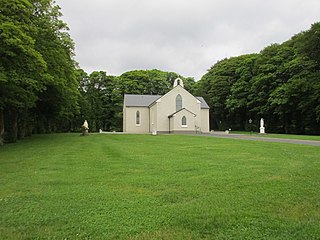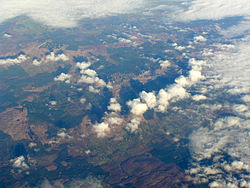
Ireland is an island in Northern Europe in the north Atlantic Ocean. The island, of up to around 480 km (300 mi) north-south, and 275 km (171 mi) east-west, lies near the western edge of the European continental shelf, part of the Eurasian Plate. Its main geographical features include low central plains surrounded by coastal mountains. The highest peak is Carrauntoohil, which is 1,039 metres (3,409 ft) above sea level. The western coastline is rugged, with many islands, peninsulas, headlands and bays, while the southern and northern coasts feature a smaller number of substantial sea inlets, such as Lough Foyle and Cork Harbour; no part of the land is more than around 110 km (68 mi) from the sea. It was administratively divided into 32 counties, gathered in 4 provinces, though current arrangements, especially in Northern Ireland, differ from this model. The island is almost bisected by the River Shannon, which at 360.5 km (224 mi) with a 102.1 km (63 mi) estuary is the longest river in Ireland and flows south from County Cavan in the province of Ulster to form the boundary between Connacht and Leinster, and later Munster, and meet the Atlantic just south and west of Limerick. There are a number of sizeable lakes along Ireland's rivers, of which Lough Neagh is the largest.

Michael Daniel Higgins is an Irish politician, poet, broadcaster and sociologist who has been serving as the ninth president of Ireland since 2011.

The Electricity Supply Board is a state owned electricity company operating in the Republic of Ireland. While historically a monopoly, the ESB now operates as a commercial semi-state concern in a "liberalised" and competitive market. It is a statutory corporation whose members are appointed by the government of Ireland.

Cúil Aodha, anglicised as Coolea, is a townland and village in the Gaeltacht region of Muskerry in County Cork, Ireland. The area is near the source of the River Sullane in the Derrynasaggart Mountains.

Ballinakill is a natural harbour near the town of Letterfrack in County Galway in Ireland.

The Ballywater Wind Farm is located between the villages of Kilmuckridge and Ballygarrett, in County Wexford, Ireland. The onshore wind farm, which commenced operation in 2005, has a capacity of 42 MW. It consists of 21 wind turbines, and is visible from the R742 regional road.

Ciarán Cannon is an Irish Fine Gael politician who has been a Teachta Dála (TD) for the Galway East constituency since 2011. He previously served as a senator for the Progressive Democrats and was the last elected leader of that party. He served as a Minister of State from 2011 to 2014 and again from 2017 to 2020. He served as a Senator from 2007 to 2011, after being nominated by the Taoiseach.
The electricity sectors of the Republic of Ireland and Northern Ireland are integrated and supply 2.5 million customers from a combination of coal, peat, natural gas, wind and hydropower. In 2022, 34 TWh were generated. In 2018 natural gas produced 51.8%, while wind turbines generated 28.1%, coal 7%, and peat 6.8% of Ireland's average electricity demand. In 2020 wind turbines generated 36.3% of Ireland's electrical demand, one of the highest wind power proportions in the world. While the United Kingdom was one of the first countries in the world to deploy commercial nuclear power plants, the island of Ireland has never had a nuclear power plant built on either side of the Irish border. Nuclear power in Ireland was discussed in the 1960s and 1970s but ultimately never phased in, with legislation now in place explicitly forbidding its introduction.
The 2003 Derrybrien landslide occurred on October 31, 2003, on the side of Cashlaundrumlahan, a hill near Derrybrien in County Galway, Ireland. It was focused around turbine 68 in the Derrybrien wind farm, and disrupted further construction.
Electric Ireland is an Irish utility company that supplies electricity and gas to business and residential customers in Ireland. It is the supply division of the Electricity Supply Board, the former monopoly electricity company in Ireland. The company now operates in an open market competing for the supply of retail electricity to residential customers. Electric Ireland sells a variety of smart technology, including Electric Vehicle Home Chargers, solar PV panels, battery storage, which are also sold by Electric Ireland's online shop. Other major suppliers include Airtricity and, more recently, Bord Gáis Energy.
Rónán Mac Con Iomaire is the Director of Regional & Community Development & Language with Údarás na Gaeltachta and is an Irish author and broadcaster.

Ireland is a net energy importer. Ireland's import dependency decreased to 85% in 2014. The cost of all energy imports to Ireland was approximately €5.7 billion, down from €6.5 billion (revised) in 2013 due mainly to falling oil and, to a lesser extent, gas import prices. Consumption of all fuels fell in 2014 with the exception of peat, renewables and non-renewable wastes.

The COVID-19 pandemic in the Republic of Ireland has had far-reaching consequences in the country that go beyond the spread of the disease itself and efforts to quarantine it, including political, educational and sporting implications.
Carla O'Brien is an Irish television presenter and multimedia journalist, working with RTÉ, Ireland's national radio and television service, where she has presented Crimecall since September 2023. She previously presented RTÉ's news2day from 2012 to 2014 and Newsfeed from 2014 to 2017, as well as the Six One News, Nine O'Clock News and One O'Clock News. In her career as a dancer, she was Irish and world champion in Irish dancing, and for some years principal dancer with Riverdance.

The COVID-19 pandemic has had a deep impact on the Irish economy, leading it into a recession. Essential public health measures announced by the Irish Government to contain the spread of COVID-19 resulted in the largest monthly increase in unemployment in the history of the Republic of Ireland during March 2020. By 24 April, there were more than one million people in receipt of support interventions to the labour market, including those in receipt of the COVID-19 Pandemic Unemployment Payment and the COVID-19 Temporary Wage Subsidy Scheme. While there were job losses in all sectors, individuals working in tourism, hospitality, food and retail have seen the largest job losses.

On 12 March 2020, all schools, colleges, and childcare facilities in the Republic of Ireland were shut down in response to the COVID-19 pandemic. The shutdown resulted in the cancellation of the 2020 Leaving Certificate and 2020–2021 Junior Certificate examinations, as well as all 2020–2021 Irish language summer courses in the Gaeltacht.
Events during the year 2021 in Ireland. As in most of the world, the COVID-19 pandemic has dominated events in Ireland during this year.

Killeenadeema is a civil parish in County Galway, Ireland. It contains most of the Derrybrien mountains, which hold the Derrybrien Wind Farm.
Events during the year 2022 in Ireland.












